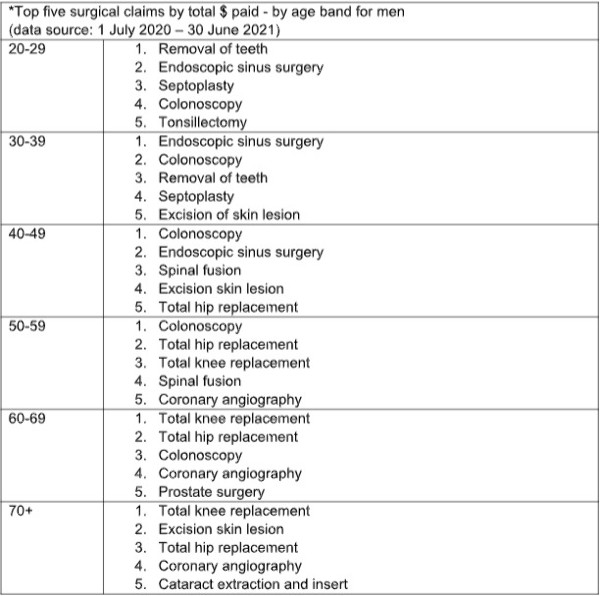
Southern Cross Health Insurance has released the top surgical claims by age and it shows younger people get their noses and teeth fixed, while older people it's more about hips and knees.
According to the Southern Cross Healthy Futures Report 2020, 12% of men don’t seek professional advice or treatment when they’re really unwell, and 34% take more than two days to seek that advice.
This is despite 57% being worried about experiencing or developing an illness and 39% being concerned about inheriting an illness.
Southern Cross chief medical Officer Dr Stephen Child says “The ‘she’ll be right attitude’ is still an issue when it comes to New Zealand men taking their health seriously, and often they are too scared to volunteer the information to their GP or family, or they put it off thinking it’s not serious enough."
Dr Child says families can play an important role in getting health conditions checked before it's too late, providing support when someone becomes unwell and "...to create a safe space for open conversations if anyone has concerns such as seeing a change in behaviour or something physical like an unusual looking mole."
Child says Southern Cross Health has revealed its top surgical claims for men at different ages because it’s important to know what types of health conditions are common as they enter different life stages.
“For young men in their 20s or 30s, we see a lot of claims for minor surgery such as removal of teeth, sinus surgery and septoplasty.
"However, by the time they have reached middle age, we start to see more claims related to men ageing.
“Colonoscopy tops the list for men in both their 40s and 50s, hip and knee replacements become more commonplace and spinal fusions start to make an appearance on the top five list," Dr Child says.
When men enter their 60s and 70s dodgy hips and knees become more of an issue and Southern Cross also receives a high number of surgical claims for hearts and prostate so men must have regular heart checks and make prostate screening a priority.
"In men over 70, many need cataract surgery as eye health starts to deteriorate,” says Dr Child.

It’s also important to have health conversations with family because knowing your family health history helps people to assess their own health risk for developing conditions or diseases.
“A lot of hereditary diseases like high blood pressure and high cholesterol can be managed through healthy weight and diet.
"But if heart disease or cancer runs in your family, you may want to start screening for those earlier than recommended, or find out if there is a genetic link, which there is with some gastric cancers and a mutation in the CDH1 gene,” says Dr Child.
“Talking about mental health is also an important conversation to help address the increasing rates of suicide, particularly among men.”





Comments
No comments yet.
Sign In to add your comment